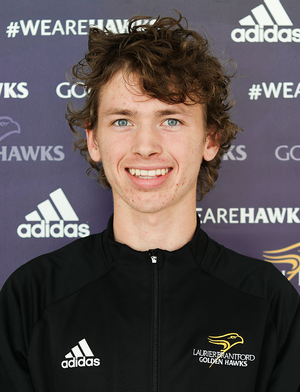A celebrated Canadian author and his award-nominated book are at the core of a new initiative within the Contemporary Studies program aimed at inspiring discussion and unity between its courses and its students. J. Edward Chamberlin’s non-fiction work If This Is Your Land, Where Are Your Stories?: Finding Common Ground will be the centrepiece of an evolutionary period for the popular CT program here at Laurier Brantford. Dr. Ian MacRae, the motivating force behind the change, says that there is a practical reason behind the shift.
“Laurier Brantford has a critical mass of students,” says MacRae. “Numbers are now there to support university and community culture.”
The change is being felt most predominately in the realm of Contemporary Studies where Chamberlin’s 2004 book will be required reading for all first-year CT classes and second-year methodologies students. It will also be available for professors to use at their discretion in senior courses. In the book, Chamberlin, an aboriginal adviser who has worked on land claims in Canada, Australia and Africa, analyzes the concept of “home” in a global world of constantly shifting places of origin and residence, which leads to violent struggles and conflicts.
In an effort to examine the text en masse, the whole of the campus will also be engaged outside of the classroom, as a series of events will be held to delve deeper into issues brought up by the text. Scheduled for October 19 and 20, the Grand River Forum will consist of two lectures by Chamberlin. The first day will deal with the book and the tangent topics that are strung into it, with the kickoff beginning at 4:00 P.M. at the Sanderson Centre. A reception will be held next door at the Brantford Arts Block and will be host to an Artists Speak exhibit, which will also attempt to tackle topics presented in the book through a visual medium.
Students are welcome to participate and are invited to create and invent their own visual expressions in the weeks leading up to the event.
Four weeks in advance, the Arts Block will host weekly workshops allowing those interested to work on assigned collective pieces or individual ones. This event is open to both the Laurier community and the township.
The second lecture by Dr. Chamberlain will be held on October 20 and will elaborate on the importance of core programming, an idea that is particularly relevant to Laurier Brantford. This lecture will be an opportunity for both faculty and students to present short papers, approximately 8-10 pages in length, voicing their ideas about this piece of non-fiction that has been filtered through different intellectual streams. There has also been talk of hosting a mini-film festival related to the forum in the Read Lounge so students can come between classes and enjoy intellectually stimulating pieces all day, free of charge.
Although this will be the first year of this rather ambitious effort, very few seem to be wary of the change. In fact, the groundswell of support, not only for the basic framework behind it but also for Chamberlin’s nuanced and yet intimately written work, evokes only one word: electrifying. At the top of the list of supporters are the Dean Bruce Arai, Vice President of Student Affairs David McMurray, Doctors Sue Ferguson, Katherine Rossiter, James Cairns and, last but certainly not least, Peter Farrugia, the Contemporary Studies program coordinator and chair.
When talking with anyone involved, the genuine excitement for this undertaking is infectious. After reading the book myself I must say, even at the risk of losing my mandated journalistic aloofness, I too have caught the fever. It is a book that happens to penetrate at least 11 layers deeper than most while managing to use the most beautifully simple language. The insightful literature, the fascinating author and the large-scale venture of the Grand River Forum are all intended to help students sharpen their critical thinking skills – an aim that is at the heart of the CT program.



